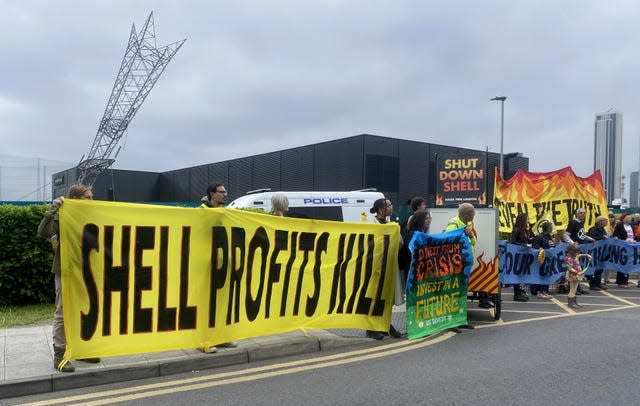Fifth of Shell investors revolt against its climate strategy during tense AGM
More than a fifth of shareholder votes were cast against Shell’s climate strategy at a tense annual general meeting.
The board faced heated exchanges with investors and protesters throughout the three-hour event at the InterContinental O2 in London on Tuesday.
A resolution to approve the current strategy saw 21.8% of shareholder votes going against management, Shell said.
Meanwhile, nearly a fifth of the votes (18.6%) backed a resolution from Dutch activist group Follow This, which called on the board to align decarbonisation targets with the goals of the Paris Agreement.
But despite a record 27 institutional investors co-filing the resolution, the result came as a drop from 20.2% in 2023.
The AGM was the first since Shell scaled back several short-term and medium-term climate targets last year.
The oil major also dropped plans to reduce oil production by 1-2% each year for the rest of the decade, stating it had already reached that target after it sold off oil fields to others.
The changes came as part of new chief executive Wael Sawan’s strategy to focus on higher-margin projects and growth in the production of natural gas to increase shareholder payouts.
Ahead of the meeting, protesters erected large signs outside the building reading “Shell profits kill” and “Your greed is killing humanity”, as a protester made speeches through a megaphone.
Inside, chairman Sir Andrew Mackenzie’s opening remarks were immediately disrupted by protesters delivering a rendition of the song Jolene, singing “Shell Kills, shell kills, shell kills”.
As security staff carried protesters out of the meeting room, they chanted: “Who kills the climate? Shell kills the climate.”
Sir Andrew went on to defend the company’s stance on the climate, emphasising the goal to be net zero by 2050 and explaining how it believes the energy system will transition in the decades ahead.
The chairman argued Shell believes the world will need more liquefied natural gas (LNG) through the transition and that “oil will play a vital role for a long way to come”.
He added: “While it might be tempting to stop using oil and gas before the world is ready, we must not do so at the expense of the energy needs and aspirations of a growing global population.”
As the meeting moved on to shareholder questions, Mark van Baal, founder of Follow This, challenged the board about its environmental impact.
He said: “Dear shareholders, get a load of this. The world has pledged to halve emissions by 2030 and your company has no plans to further reduce emissions this decade.”
He asked the board: “Can you explain how Shell can be Paris-aligned without reducing emissions up to 2030, without using the word ‘believe’?”
In response, Mr Sawan argued Shell is “very much aligned with achieving a 2050 net zero outcome” and said the firm is using the most ambitious scenarios under the Intergovernmental Panel on Climate Change assessment report.

The chief executive then urged investors to vote against the resolution, arguing it is “bad for the environment”, “bad for our customers”, “bad for you as shareholders” and “bad for governance”.
Responding to the 18.6% vote for the resolution after the meeting, Mr van Baal said: “Votes for this climate resolution show which investors are committed to Paris and which investors endorse Big Oil’s refusal to take meaningful climate action.”
Later in the meeting, a woman addressed the board about Shell’s alleged human rights abuses and environmental destruction in the Niger Delta.
After speaking for a few minutes, Sir Andrew said she had gone over her allotted two minutes and security staff swarmed the woman, asking her to leave.
Sir Andrew intervened, allowing her to continue but she grew tearful as she questioned why security had hassled her and who was going to clear up the pollution in the Niger Delta that has cost lives after Shell sells its majority stake in the local operator.
A fellow shareholder confronted the board and highlighted that the one shareholder who was surrounded by security for speaking longer than two minutes was a young woman of colour.
“(It) makes me, as a shareholder, very uncomfortable, and I hope that it makes the board feel uncomfortable and fellow shareholders,” she said.
In response, Sir Andrew said there are processes in place to ensure security, adding: “I’m sorry it didn’t occur in the right way.”
A Shell spokesperson said: “We respect people’s right to express their point of view and welcome any constructive engagement on our strategy and the energy transition.
“However, these protesters have shown that they are not interested in constructive engagement.
“We agree that society needs to take action on climate change, and we firmly believe our climate targets are aligned with the more ambitious goal of the Paris Agreement on climate change.”
Following the results, Mr Sawan said: “Shell’s shareholders have strongly backed our strategy to deliver more value with less emissions, as we transform to become a net-zero emissions energy business by 2050.
“Our focus on performance, discipline and simplification enables us to invest in providing the energy the world needs today, and in helping to build the low-carbon energy system of the future.”

 Yahoo Finance
Yahoo Finance 